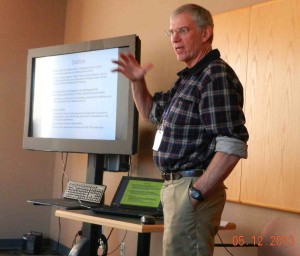
News/Reports
Failing To Plan Or Planning To Fail: A Case For A New Protected Areas Vision In BC
Mike Fenger and Jenny Feick, Ph.D.
We are critical of conservation initiatives and the messaging to British Columbians of the adequacy and success of conservation measures within existing Parks and the areas between Parks. A new approach is desperately needed. We provide both evidence of current shortcomings and elements integral to a new conservation vision. This presentation was given at the 4th BC Protected Areas Forum held in Kamloops December 3 – 5, 2013 (See Forum agenda and presentations posted at http://www.unbc.ca/bc-protected-area-research- forum). This presentation is posted on the Friends of Ecological Reserves web site https://ecoreserves.bc.ca/ .
Link to the full PDF of the PowerPoint presentation:
Failing to Plan or Planning to Fail-Final-Feb2-14

Abstract:
Given climate change, the accelerating pace of natural resource development in British Columbia (B.C.), and economic factors, the Friends of Ecological Reserves (FER) see an urgent need for a robust, new protected areas conservation strategy, which would include the creation of new Ecological Reserves (ERs) and a system that explicitly considers the rapidly changing natural and cultural landscape and shifting climate context. This vision includes strategic regional land use and natural resource planning with full involvement of First Nations (FN) as well as stakeholders in the private, public and civil society sectors. This would provide a means to collaboratively craft measures at a local level for sustainable use of natural resources that are mindful of our shared future. A sub-regional strategic planning process would determine the sustainable, long term integration needed to optimize conservation opportunities while adding economic developments.
B.C. has the largest and most intact ecosystems remaining in North America in the least developed landscapes south of the 60th parallel. The strategic land use plans of the 1990s established the current protected areas but are dated in light of changes. The effectiveness of conservation measures among protected areas such as Old Growth Management Areas, Wildlife Habitat Areas and various riparian reserve protection measures are unknown. Land use plans did not consider climate change effects or the pace and scale of cumulative effects. There is sufficient evidence that the status quo for resource management is not working in BC, though that is not widely understood by the public. Accelerated natural resource development in a period of global climate change warrants an equally accelerated and efficient process to address strategic conservation values before options to make foresighted decisions disappear. Strategic conservation planning seeks to increase the probability of sustaining the diversity of Canada’s most ecologically diverse and biologically rich province.
Link to the full PDF of the PowerPoint presentation:
